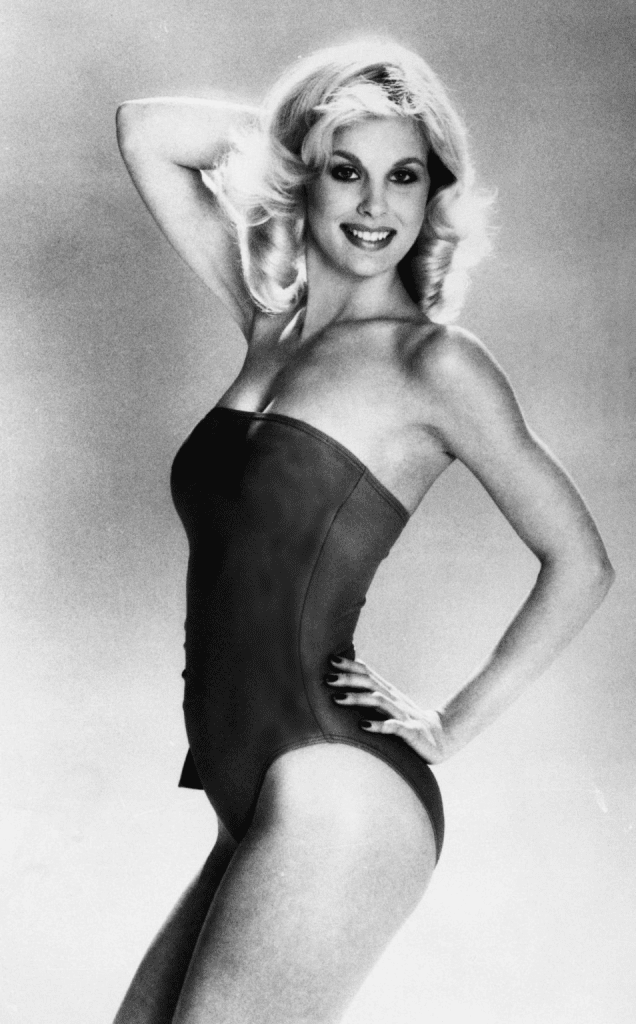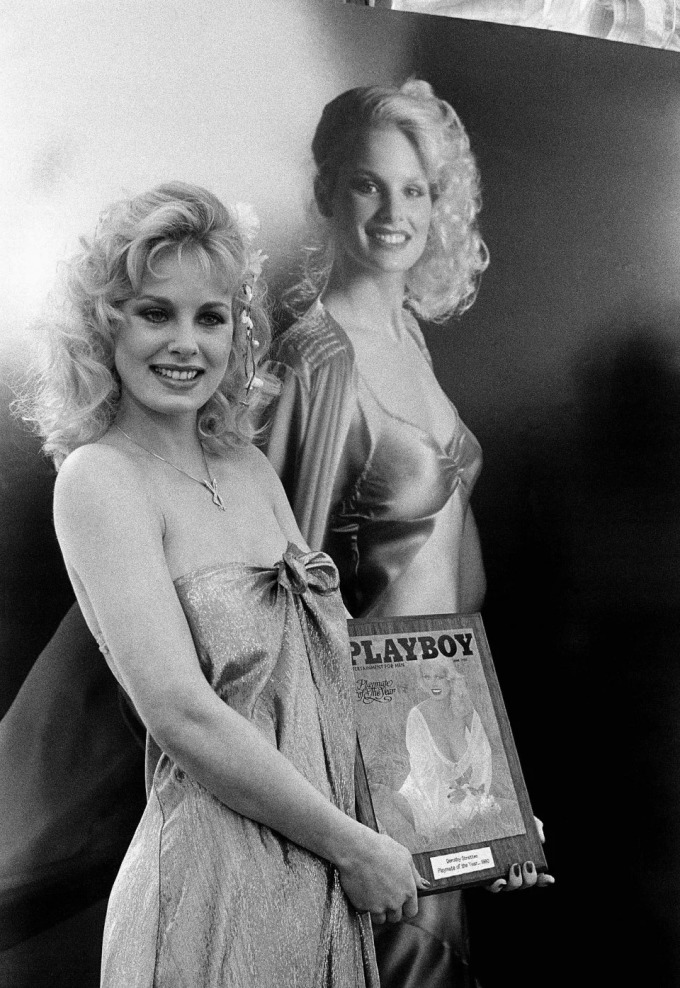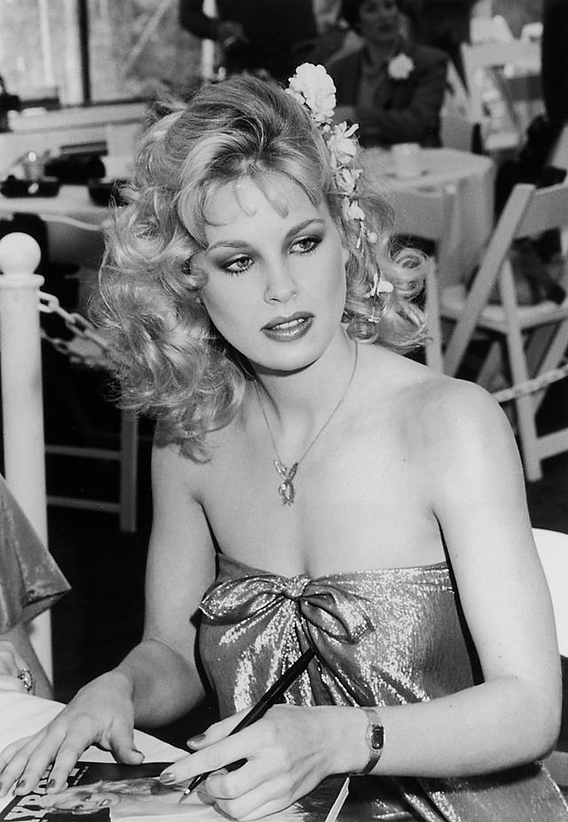Dorothy Stratten, with her ethereal beauty and radiant charm, was poised to become one of Hollywood’s brightest stars. Known as a Pl*yboy Playmate of the Year and a promising actress, she captivated audiences with her stunning presence and ability to light up the screen. However, behind the glamour and rising fame was a story filled with exploitation, heartbreak, and an untimely, tragic end that shocked the world.

From Small-Town Girl to Pl*yboy Fame
Dorothy Ruth Hoogstraten was born on February 28, 1960, in Vancouver, British Columbia, Canada. Raised in a modest family, she spent her childhood as a quiet, unassuming girl who worked hard to support her family. By the time she reached her teenage years, Dorothy worked part-time at a local Dairy Queen in Coquitlam.
It was here in 1977 that Dorothy met Paul Snider, a flashy and manipulative promoter who would change the course of her life forever. Enamored by Dorothy’s natural beauty, Snider convinced her to pose for n*de photographs—a decision that would ultimately catapult her into fame. He submitted the photos to Pl*yboy magazine, and Dorothy soon found herself on a plane to Los Angeles, where her life would never be the same.
In 1979, Dorothy was selected as Playmate of the Month, and by 1980, she had earned the coveted title of Playmate of the Year. Hugh Hefner, the founder of Pl*yboy, recognized her potential and described her as the “next Marilyn Monroe.” With her iconic blonde hair, gentle demeanor, and sultry beauty, Dorothy quickly became a rising star.
A Promising Career in Hollywood
Dorothy Stratten’s modeling success opened the doors to Hollywood. Under the guidance of Hugh Hefner and other industry insiders, she began securing small acting roles. She appeared in popular TV shows like Buck Rogers in the 25th Century and Fantasy Island, as well as films such as Skatetown, U.S.A. and Americathon in 1979.
Her breakthrough came with a lead role in the 1980 romantic comedy They All Laughed, directed by Peter Bogdanovich. The movie signified Dorothy’s transition from being seen merely as a model to a serious actress. Bogdanovich, who had taken a keen interest in Dorothy, saw her talent and wanted to showcase her as a genuine performer.
During the filming, Dorothy and Bogdanovich developed a romantic relationship, marking the beginning of a rift between Dorothy and Paul Snider. While Dorothy’s career soared, Snider—who still saw himself as her manager—became increasingly possessive, jealous, and desperate.
A Toxic Relationship: Paul Snider’s Obsession
Paul Snider was a controlling figure in Dorothy’s life. While he initially seemed like a supportive partner, his darker side soon emerged. Snider saw Dorothy as his ticket to fame and fortune, but as her success grew, so did his insecurity and obsession.

By the early 1980s, Dorothy’s friends and colleagues began warning her to distance herself from Paul. They recognized his manipulative nature and feared for her safety. Even Hugh Hefner reportedly urged Dorothy to break free from Snider, describing him as “dangerous” and “troubled.”
Despite these warnings, Dorothy found it difficult to sever ties completely. She sympathized with Snider and, in her kindhearted way, hoped to let him down gently. This decision would have devastating consequences.
The Tragic Murder of Dorothy Stratten
On August 14, 1980, Dorothy agreed to meet Paul Snider at their former West Los Angeles home to discuss financial matters and finalize their separation. Against the advice of friends and colleagues, she went alone, believing she could resolve things amicably.

What happened next remains one of Hollywood’s darkest moments.
Later that evening, Snider’s roommates returned home to find a gruesome scene. Dorothy Stratten, just 20 years old, was found dead in the bedroom, killed by a shotgun blast. Snider had murdered Dorothy in a jealous rage before turning the gun on himself.
The news of her violent death sent shockwaves across the entertainment industry and the world. Friends, family, and fans mourned the loss of a young woman whose star was only beginning to shine.
The Aftermath and Cultural Impact
Dorothy Stratten’s tragic story sparked conversations about s*xism, exploitation, and the dark side of fame. Her death became a grim reminder of how quickly success can turn into tragedy when trust is misplaced in the wrong people.
- Hugh Hefner, criticized for his role in Dorothy’s career, denied responsibility but acknowledged the pain her death caused.
- Director Peter Bogdanovich, devastated by Dorothy’s loss, blamed the toxic culture surrounding Pl*yboy and Hollywood for contributing to her demise. In 1984, he wrote The Killing of the Unicorn, a book that exposed the exploitation he believed Dorothy endured.
Dorothy’s life and death inspired countless retellings, including the 1983 film Star 80, directed by Bob Fosse, which depicted the events leading up to her murder. Bryan Adams’ song The Best Was Yet to Come and Red Hot Chili Peppers’ Californication also paid tribute to her.

Dorothy Stratten’s Untapped Potential
Those who knew Dorothy describe her as more than just a beautiful face. She was kind, genuine, and determined to carve out a meaningful career. Many believe that had she lived, Dorothy would have become a Hollywood icon, alongside names like Julia Roberts and Reese Witherspoon.
Her natural talent, paired with her charisma and stunning beauty, left an indelible mark on everyone she encountered. She was poised for greatness, but her life was tragically cut short.
Dorothy’s Lasting Legacy
More than 40 years after her death, Dorothy Stratten remains a poignant symbol of unrealized potential and the price of fame. Her story continues to resonate with fans and serves as a cautionary tale about exploitation, control, and the importance of recognizing danger before it’s too late.
Director Peter Bogdanovich continued to honor Dorothy’s memory, maintaining a close relationship with her family. He later married her younger sister, Louise Stratten, further solidifying his connection to the family Dorothy left behind.
Conclusion
Dorothy Stratten’s life was a mixture of beauty, innocence, and tragedy. As the young woman hailed as the “next Marilyn Monroe,” she captured hearts around the world but paid the ultimate price for trusting the wrong person. Her untimely death serves as a reminder of the fragility of life and the darkness that can exist behind the glamour of fame.
While Dorothy’s story ended far too soon, her legacy lives on through the memories of those who loved her, the films she starred in, and the lessons her life and death taught us. Even today, Dorothy Stratten remains a timeless figure—a beautiful soul who continues to inspire and captivate generations.